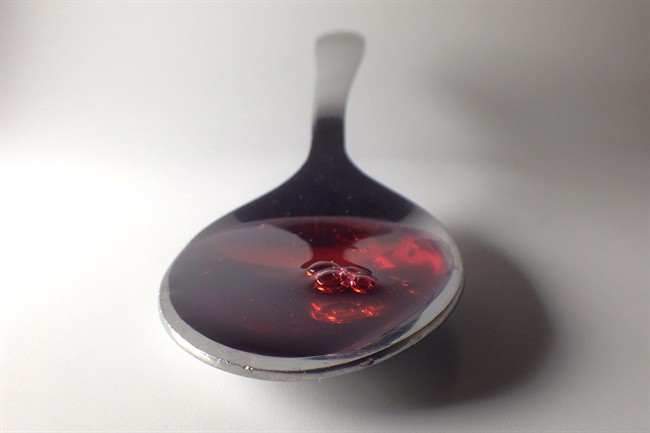Do you reach for vitamin C, Gatorade and Cold FX when you feel a cough, cold or sore throat coming on? It’s that time of the year again with germs and sick days at your doorstep.

“There are lots of products you can get over the counter, but it’s hard to say what will work for you. Over-the-counter products are for temporary relief of symptoms, though,” Christine Singh, a Toronto-based pharmacist at Shoppers Drug Mart, said.
“People get frustrated when there’s not much they can do so they go looking. We believe in theories or possible naturopathic therapies that don’t have a lot of research to back them in hopes that they do something,” Dr. Michael Allan told Global News in January 2014.
READ MORE: What happens to your body when you get the flu, step by step
That year, the University of Alberta researcher reviewed hundreds of studies on how to treat the common cold and suggests some remedies are basically a waste of time.
Each year, adults typically get colds two or three times, while kids under two get sick about six times a year.
Singh and Allan offer their tips on what works and what doesn’t when it comes to fighting through cough and cold season.
Antihistamines
There’s some research that suggests that adults could get a small or moderate benefit from a combination of antihistamines and decongestants with acetaminophen or ibuprofen. (Allan couldn’t name brand names in the case of drugs, but typical antihistamines include Benadryl, while acetaminophen is more commonly known as Tylenol and ibuprofen as Advil.)
- After controversial directive, Quebec now says anglophones have right to English health services
- Why non-alcoholic beer is gaining steam at Oktoberfest: ‘Nobody will judge you’
- Something’s fishy: 1 in 5 seafood products are mislabelled, study finds
- Recall expands for Nutrabolics vegan bars over undeclared milk
“Not all products are safe for everyone so you need to check with your pharmacist,” Singh warned. Some drugs could interact with your daily medications, or side effects could be a concern.

Get weekly health news
READ MORE: What Canadians should expect from the 2016-17 flu season
These medications are supposed to act as fever reducers, so they can help to tame a rising temperature, she said.
Kids under five shouldn’t be taking any antihistamines — but if they’re dealing with aches, pains or a sore throat, acetaminophen or ibuprofen are good choices, the latter being the best option, Allan said.
Honey was even a promising candidate to tame a child’s cold, but not for babies 12 months and under. For other youngsters, Allan said, some research suggests 2.5 to 10 millilitres — or half a teaspoon to two teaspoons — of honey right before bed might help kids and parents sleep through the night.
Cough medicines
Cough medicines didn’t seem to benefit kids but they might offer a “slight” benefit in adults, according to Allan’s research.
“Much more evidence now exists in this area, but many uncertainties remain regarding interventions to prevent and treat the common cold,” the authors wrote.
READ MORE: Stop giving codeine to kids for cough, pain symptoms, doctors warn parents
Singh said that cough suppressants help to minimize how often you’re coughing or to relieve the mucus building up in your chest, though.
Even the FDA is recommending against over-the-counter cold medication in young kids. It’s still unclear how beneficial they are while the risks of overdosing or side effects are more worrisome.
Zinc
Zinc — if adults are willing to suck on the lozenges every few hours — also seemed to help but even then the research isn’t too strong. No one should be taking intranasal zinc sprays, though. Allan says those have been linked to unresolved issues and potentially harmful incidents.
Bed rest and good hygiene
At the end of the day, getting plenty of rest and staying hydrated are your best bets when you’re battling germs. If you’re feeling under the weather, stay home and under the covers to give your body time to heal.
READ MORE: 7 steps to surviving the cold and flu season without getting sick
Keep germs at bay: Teach your kids to wash their hands with soap for as long as it takes to sing Happy Birthday or Twinkle, Twinkle, Little Star so they’re thoroughly washing up.
If you sneeze into the crease of your elbow, you’re less likely to transmit germs than you would if you cough into your hands, too.
carmen.chai@globalnews.ca
Follow @Carmen_Chai








Comments